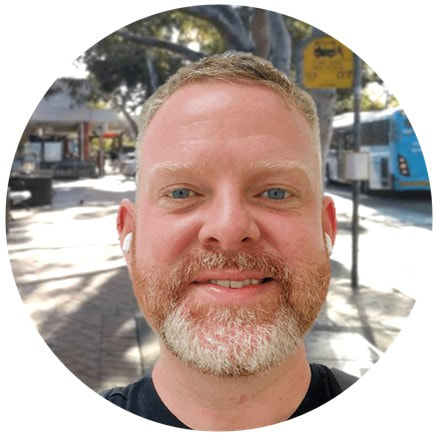|
‘I did but see her passing by, yet I will love her till I die,’ – these are words former Prime Minister Robert Menzies used when making a speech to the Queen when she first visited Australia. We’ll never know if the Prime Minister was genuinely swept away by the Queen’s aura as he gazed at her or if he was making the most of a chance to ingratiate himself with her. But we know of other similar stories which may be less ambiguous: for instance, the Renaissance author Dante Alighieri when he caught sight of the beautiful Beatrice, was so carried away by the sight of her that Beatrice became his model for characters in his famous writings even though the two never met again.
My point is that every moment of ordinary life can be seen to be rich with special, even sacred meaning - full of spiritual meaning - if only we have the eyes to see. Jesus himself says: ‘Let anyone with ears to hear, listen,’ [Mk 4:23] and he asks, ‘Do you have eyes and fail to see? Do you have ears and fail to hear?’[Mk 8:18] and finally, [‘What I say to you, I say to all, “Keep awake!” [Mk 13:37] Just recently, I noticed an item on my screen encouraging the viewer to take time to observe momentary and unexpected events of special beauty or appeal in the midst of ordinary life and to commit that small observation to memory so it could be recalled and savoured at a later time. I have also heard Catholic Franciscan Priest, Fr Richard Rohr advise much the same thing, only he says to observe the event for at least 15 seconds before letting our attention move away because we need that length of time to commit the moment to memory for later recall. The point of both observations is to remind us that today’s ordinary everyday life, even for those who have retired or are unemployed, can be rushed and stressful. We experience vast amounts of stimulation coming in to our minds all the time and this makes it very difficult to stay in the moment. In being held constantly mentally busy, we lose touch not only with ourselves but with the transcendent world unavailable to the passing glance. So it becomes important to rediscover inner stillness to put us back in touch with that world. We can do this at least in part by stopping to pay attention to and savouring the world around us. Pausing to notice small events happening around us is a way to reduce anxiety immediately and also to provide at the very least, some pleasant moments for reflection at the end of the day. And even better than that, these experiences can become a focus for thanksgiving for the blessings of life, or to reality, or to the universal consciousness or to God – whichever your view of what is ultimate might be. It goes without saying that such quiet reflection later in the day on the small but lovely or fascinating events we come across is a fine way in to meditation. More prosaically, recalling to mind those events which make us smile in wonder and delight can be a very useful antidote to those times when we can’t sleep in the middle of the night. That 2.00 – 3.00 a.m. wakefulness is often supercharged with anxiety as we worry about all kinds of issues, past, present and not even here yet and about which – at that moment – we can do nothing. How much more calming and positive it can be to recall the good things! But going further than that, I would suggest that experiencing such ordinary/extraordinary moments through our senses as we relate to perhaps a beautiful sunset; the song of a bird at dawn; the taste of a meal lovingly prepared; the perfume of a dry landscape suddenly wet with rain or the silky feel of a newborn’s skin are also reminders that God is in everything. Our response of awe or delight is but a reminder of that divine mystery which surrounds us. And if we walk this rediscovered path with God as our companion and become newly aware that it is in God that we live and move and have our being, who knows where our path will lead us. It may not be to writing famous novels, or becoming influential leaders or martyrs for a cause, but we may become a source of hope, courage and new life to those we meet. Now, while our chances of having a major life-change may be limited, we may have had a moment which gave a silver lining to the clouds of our day or even changed us in some way. Let’s think about that and give thanks.
1 Comment
Over a coffee recently, I learned that to ‘encourage one another and build each other up’ is not the norm! My coffee partner was a young Lane Cove woman discovering the riches of Christianity. She was quite taken by this piece of biblical wisdom (1 Thessalonians 5:11) which I had shared on Facebook recently. I was surprised, because I thought this was obvious. As we discussed it further, it became clear her surprise was justified. Encouraging and building each other up can easily be replaced by a competitive spirit. Unfortunately, people tend to be pitted against each other in business, sporting, educational and many other environments. Relationships can become a trade commodity based upon, ‘How can you benefit me?’ When this carries over into family dynamics, it is particularly sad. Commodifying someone is to dehumanise them.
I enjoy competitive games and I like to win, but not at all costs. (I hope this doesn’t come as a surprise to my family and sporting friends!) Valuing my opponents as people and their self-esteem should always be my first priority. Competitive environments are the trickiest area for me in applying this wisdom. Seeking to encourage others is now a way of life for me in other areas. It causes me to reflect that it hasn’t always been this way. It is something I have learned through a drip feed of decades of Christian teaching. My self-esteem has also grown via the same source and through wonderful encouragers, who told me what they saw in me, when I couldn’t see it myself. Hearing the teaching, augmented by my personal experience of encouragement, combined to produce this good fruit in me, over time. To sincerely encourage someone can help them tremendously. They may not tell you, nor show immediate signs of the benefit. If they have been subject to many discouraging or dehumanising experiences, they may even reject your encouragement initially. Their emotional ‘bucket’ may be so depleted of helpful, encouraging content that it will take a long time to fill again. They may not be able to ‘hear’ encouragement, particularly in some areas of their lives where damage has been done. But if you do care for them, continue to try and find an area of their life to build up where they can hear you. Remember, there is good and bad in everyone. Let’s choose to focus on the good and acknowledge it. My life was rich and full in my late 40’s. I was happily married with 3 young adult children whose lives were full of interest and change, completing high school and discerning career pathways. I loved my role as Associate Pastor at our local Church which was diverse and demanded my best effort. Why pursue this Period of Discernment when it hadn’t led in the direction I was discerning? Because I am a woman of my word – and I had committed to the full process. Besides, there was still a niggle that there may be a further call on my life.
Over the decades of going to Church, I had on 2 occasions read a leaflet near noticeboards about Deacon (previously Deaconess) Ministry. Both times I remember thinking that the description of a Deacon fitted my interests perfectly. But I quickly dismissed them with an attitude of ‘I’m not good enough to be ordained and haven’t been called to it in anyway’. Coincidentally, both my Period of Discernment (PoD) Supervisor and my Ministry Supervisor were both Deacons, despite this being a minority role in the Uniting Church. One had been a long-term missionary in south-east Asia, the other a Mental Health Chaplain. A Deacon role was concerned with making a way for congregational members to enact their Christian faith in service of their local community; enactment of social justice; and as an innovative and passionate leader creating new forms of Christian leadership – to name a few. My PoD Supervisor suggested books for me to read and one of them connected with this last aspect of leading innovative change in the Church. This book spoke to me convincingly, as I read with amazement how I embodied the suggested characteristics of such a ministry agent so fully. Maybe this dissatisfaction with the status quo of our thriving church was from God after all? I finally decided to become a Candidate for Minister of Deacon while doing the required introductory subject about Ministry in the Uniting Church. I was doing my reading while flying over to Tasmania to see my brother, concerning roles of Minister of the Word (MoW) and Minister of Pastor. It felt dead to me. I was already a Pastor in my Church and the MoW description just didn’t resonate with me. Again, I thought the process was over. On the flight home, I read the Minister of Deacon summary. It was very similar to the MoW description – just giving a different emphasis to which ministry roles were prioritised – more of an outward-looking, community focus. Unexpectedly at the time, this one resonated! Looking back, I see this as unsurprising, but at the time it startled me into action. Both Minister of the Word and Minister of Deacon are ordained roles in the Uniting Church of equal status. Ordination has different meanings and regulations in the variety of Christian denominations, but basically the person to be ordained commits to lifelong availability for service within the Church. The Church confers a new status upon the person and also commits to their welfare. More details here . Much process and many hurdles followed, including becoming an extremely reluctant Bachelor of Ministry student at age 50! But most subjects were enlivening and eye-opening, and at times, extremely challenging. I wouldn’t have made it through, especially given some huge personal hurdles over this period, if it hadn’t been very clear to me that I was called to this. Life was hectic and I learned that perfectionism had to go if I was going to make it through. Despite the difficult path and clear call, it appeared there was no placement for me to be ordained into that matched my specific passion to be a change agent in the Church. But after I prayed for direction for my future, my current position of Community Chaplain, 1400kms away in Sydney, was brought to my attention within 20 minutes! This is a whole new story, but suffice to say for now that God led me very surely to meet a faithful, generous congregation, who had been arduously planning this role for many years too. Numbers 23:19 (ESV Bible) “God is not man, that he should lie, or a son of man, that he should change his mind. Has he said, and will he not do it? Or has he spoken, and will he not fulfill it?” Hebrews 10:23 (ESV Bible) “Let us hold fast the confession of our hope without wavering, for he who promised is faithful.” |
AUTHORThe articles here are currently written by Liam McKenna, Lane Cove Community Chaplain. Archives
August 2023
Categories |


 RSS Feed
RSS Feed